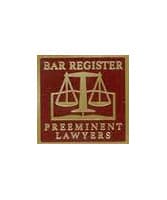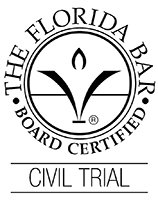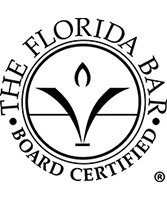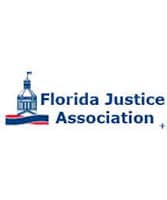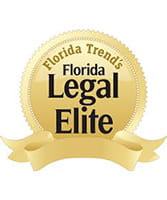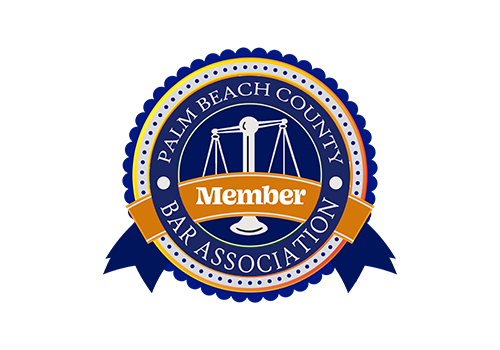
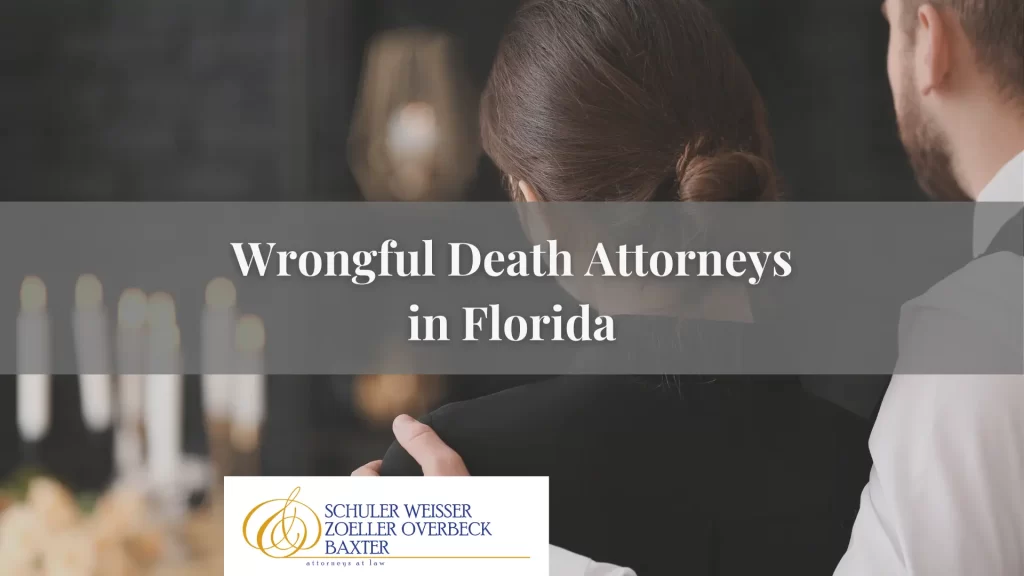
If you lost a loved one in an accident caused by someone else, you might be entitled to compensation from a wrongful death lawsuit. The Florida personal injury lawyers of Schuler, Weisser, Zoeller, Overbeck & Baxter P.A. have over 40 years of experience representing individuals like you in the most sensitive and devastating cases. We understand how difficult it is to move forward from this. You can depend on our legal team to be your advocate and fight for the justice you and your family deserve.
It is never easy grieving the loss of someone you love, and it can be particularly challenging if the death happened under entirely preventable circumstances. Knowing another person is responsible for your relative’s death, and that person could have avoided their careless actions makes this situation unfair and traumatic.
The Florida wrongful death attorneys of Schuler, Weisser, Zoeller, Overbeck & Baxter P.A. can help you hold the negligent party liable and pursue the maximum available compensation. Paying funeral costs, medical bills, and other expenses is overwhelming and can lead to debt. You shouldn’t have to pay out of pocket if someone else were entirely at fault for the fatal accident.
Call Schuler, Weisser, Zoeller, Overbeck & Baxter P.A. at (561) 689-8180 for a free consultation and let us represent you and your family in your wrongful death case.
Common Wrongful Death Cases in Florida
Wrongful death is a person’s death caused by someone else’s wrongful act, breach of warranty or contract, default, or negligence. Various situations could result in a fatal injury or death of the victim.
The most common types of wrongful death cases Schuler, Weisser, Zoeller, Overbeck & Baxter P.A. handles include:
- Car accidents – Sharing the road with other drivers means taking the risk of being involved in an accident. You can’t prevent other people from acting carelessly. Distractions, inattention, and reckless behavior often result in collisions causing injuries and death.
- Truck accidents – Commercial trucks usually cause catastrophic injuries and damage in accidents. The occupants of a smaller vehicle could die instantly from the violent impact or sustain life-threatening injuries. In 2019, 4,119 people died in accidents involving large trucks.
- Pedestrian accidents – Pedestrians are at a higher risk of death in a collision than anyone else. Walking across the street exposes a person to passing vehicles and inattentive drivers that could swerve onto the sidewalk or heedlessly blow through a crosswalk.
- Bicycle accidents – Although bikers can use designated bicycle lanes, there typically isn’t a barrier protecting them from cars whizzing by. A driver could become distracted and drift into the bike lane, sideswiping the rider.
- Motorcycle accidents – Motorcycles don’t have airbags or seatbelts like other motor vehicles. The rider is completely exposed to the outside elements. They could get ejected from their bike, run over by a car, or impaled by flying debris during an accident.
- Boating accidents – Boat operators often think they’re safer on the water than the road because there aren’t as many obstacles or other vessels to navigate around. However, boats can crash just like cars, and these accidents also lead to occupant fatalities.
- Premises liability – Spending time on another person’s property should be a safe experience. Dining at a restaurant, shopping at the mall, or taking in the sunshine at the public swimming pool should not lead to fatal accidents. Unfortunately, owners sometimes fail to maintain their properties, exposing visitors to slip-and-fall hazards, toxic chemicals, and other dangers that can lead to death.
- Nursing home abuse – Nursing home staff are responsible for providing the necessary treatment and care to all their patients. When physical abuse or neglect occurs, the vulnerable older adult could suffer severe injuries and die.
- Aviation accidents – People board airplanes every day to travel for work and pleasure. Most planes arrive safely at their destinations. However, some end up crashing due to pilot error, malfunctioning parts, and other issues, and the passengers are killed.
- Medical malpractice – Adults and children depend on their doctors to cure diseases, heal injuries, and help them stay healthy. Negligence can lead to surgical errors, misdiagnosis, and other mistakes that cause the patient’s death.
- Product liability – Manufacturers place products on the market for consumer use. Some contain defects from poor design, lack of warning labels, or manufacturing errors. A malfunctioning kitchen appliance could explode and cause fatalities to anyone in the vicinity.
The Florida wrongful death attorneys of Schuler, Weisser, Zoeller, Overbeck & Baxter P.A. can investigate the incident to determine who was at fault. We will gather all available evidence to prove what happened and show that you and your family deserve compensation for the losses you suffered.
Who Can File a Wrongful Death Lawsuit?
Florida law allows one individual to pursue a wrongful death case. The personal representative of the deceased’s estate can file the lawsuit. This person is also referred to as the executor. The designated personal representative must file on behalf of the estate and surviving family members. Eligible surviving family members include:
- Spouses
- Children
- Parents
When the beneficiary prepares the case to initiate in court, they must name all the beneficiaries in the legal documents. That means the complaint should include anyone eligible to receive compensation for losses suffered from the victim’s death.
Possible Compensation Available in a Florida Wrongful Death Case
State law splits wrongful death losses into two categories: those suffered by the estate and those suffered by the family. Since the personal representative is supposed to act on behalf of the estate and surviving loved ones, they should seek compensation to cover losses in both categories.
The compensation surviving family members receive could cover losses, such as:
- Funeral and medical costs paid by a specific relative
- Mental pain and suffering
- Loss of protection and companionship
- Loss of instruction, companionship, and guidance from a parent
- Loss of services and support
The losses suffered by the estate that may be eligible for compensation include:
- Funeral and medical expenses paid by the estate
- Lost wages and benefits from the date of the injury to the date the victim died
- The value of benefits and wages the deceased could have earned if they were still alive
You could also pursue punitive damages in a wrongful death case. However, you must provide the jury with clear and convincing evidence that the defendant is guilty of gross negligence or intentional misconduct to receive this monetary award.
What Is the Deadline to File a Wrongful Death Lawsuit?
If you want to sue the at-fault party for causing your loved one’s death, you have to comply with the statute of limitations. This is a strict timeframe for pursuing legal action against another person or a company in civil court. Florida has a two-year statute of limitations for wrongful death cases. That means you must file suit within two years of your relative’s death if you want to seek compensation.
Three exceptions could extend the deadline, giving you more time to initiate your case. They are:
- Medical malpractice – Sometimes, surviving families don’t know that their loved one’s death happened because of a doctor’s negligence. Instead of having to file within two years of the day your loved one died, you would have two years from the date you discovered medical malpractice took place.
- Homicide – If someone murdered your relative, it might take a while to determine who the perpetrator is or track them down. The two-year statute would start on the date officers apprehend or identify the suspect.
- Government entities – There is a four-year statute of limitations for wrongful death caused by government entities and employees. For example, if your family member died in a car crash due to dangerous road conditions and the municipality responsible for maintaining the road failed to repair a known hazard, they could be held liable.
The multiple deadlines that exist and various circumstances that could delay or extend them can be confusing. Schuler, Weisser, Zoeller, Overbeck & Baxter P.A. can guide you throughout this part of the case.
How Pure Comparative Negligence Could Affect Your Lawsuit
If you choose to file a wrongful death lawsuit, you should be aware of a specific statute that could reduce your financial award. Pure comparative negligence allows a jury to diminish the final amount of available compensation by the percentage of fault shared by the victim. In other words, if your loved one’s actions contributed to their death, you could end up with much less compensation than you need to cover the losses you suffered.
As an example, let’s say there is a total of $100,000 in compensable losses. If your family member died in a car accident, but a jury determines they were 20 percent responsible for the crash, you could only receive a maximum of $80,000 in compensation.
Let Schuler, Weisser, Zoeller, Overbeck & Baxter P.A. Help You in the Fight for Justice
Our Florida wrongful death attorneys understand the emotional and financial struggles you face after losing someone you love. Even though money can’t change what happened or bring your relative back, it could offer economic relief and help you to afford the related expenses. Our team will be in your corner from start to finish of your case to provide the legal representation, advice, and support you need to get through this.
If your loved one died in an accident due to someone else’s negligence, do not hesitate to call Schuler, Weisser, Zoeller, Overbeck & Baxter P.A. for a free consultation. We are available 24/7, so you can reach us when you need us the most. Call (561) 689-8180 today or reach out to us online.
Brevard County, Broward County, Coral Springs, Davie, Deerfield Beach, Fort Lauderdale, Hallandale Beach, Margate, Miramar, Plantation, Pompano Beach, Sunrise, Weston, Collier County, Naples, Duval County, Jacksonville, Lee County, Fort Myers, Leon County, Tallahassee, Manatee County, Bradenton, Marion County, Ocala, Martin County, Indiantown, Stuart, Miami-Dade County, Aventura, Parkland, Greenacres, Royal Palm Beach, Tamarac, Wellington, Jupiter, and Miami.



